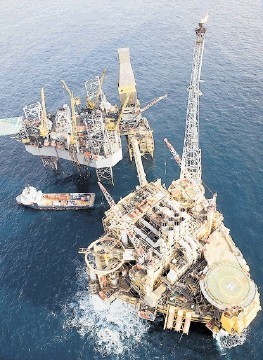
Offshore giant Total has released the first picture of the gas cloud engulfing its eerily-deserted Elgin platform in the North Sea.
The company made available the image – the cloud is visible in the background looking like haar – as it emerged the leaking installation had already wiped £5.6billion off its shares and an explosion on board could cost it another £6billion.
One expert also warned last night that any gas bubbling up from the seabed around the platform could create a “Bermuda Triangle” – with the potential to pull ships under.
The crisis has also led to fresh claims from Brussels that the time has come for the European Commission to seize control of the offshore safety regime in UK waters.
Total revealed it is considering sending its own teams into the exclusion zone set up around the platform to better assess the situation at sea level.
Oceanographer Simon Boxall said that the waters around the rig may pose a danger to vessels if the leak was creating air bubbles.
He said that any attempts to get people on to the platform by sea would be fraught with danger.
Total says it does not know whether gas has been rising from the ocean floor – but workers on a nearby supply boat claimed the water was “bubbling” around the rig before it was evacuated on Sunday. The firm is considering putting a ship into the two-mile exclusion zone to get engineers on board the installation.
Mr Boxall, from the National Oceanography Centre at Southampton University, said if methane was rising from the well, it would create a “fizzy” effect in the sea.
“A ship floats because its total density – what it weighs per cubic foot – is less than water, so it sits on top,” he said.
“If the water has air bubbles, the density of the air is very low and displaces some of the water.
“This gassy water therefore has a much lower density than the non-gassy water and any ship sitting on it will no longer be supported and will sink.”
He added: “One of the reasons that ships sometimes suddenly sink without trace in the mythical Bermuda Triangle is as a result of methane bubbles from the sea floor coming up to the surface.
“The ship then falls through them and gets enveloped in water.”
The Bermuda Triangle is a region in the western part of the North Atlantic Ocean where a number of vessels have disappeared in mysterious circumstances.
Scientists believe naturally-occurring methane in the water is to blame.
The well which Total has drilled goes more than three miles into the seabed – a frontier project that makes finding a solution to the crisis even more difficult.
“It is a very deep well. The gas they are bringing up is what we call sour gas,” Mr Boxall said.
“That gas has a high proportion of hydrogen sulphide and carbon dioxide and that makes it very flammable and quite poisonous. So the big problem they have got is dealing with a very combustible gas – unlike Deepwater Horizon where we were dealing with crude oil which ironically is very difficult to light sometimes.”
He added: “Where this is similar to Deepwater Horizon is that we have devised a way of getting the hydrocarbons out, but not a way of stopping it – which is why it could take some months to halt.”
The marine pollution specialist said the leak would not be a major environmental incident, but would cause damage close to the platform.
“Being so far offshore it is unlikely to present a threat to coastal regions,” he said.